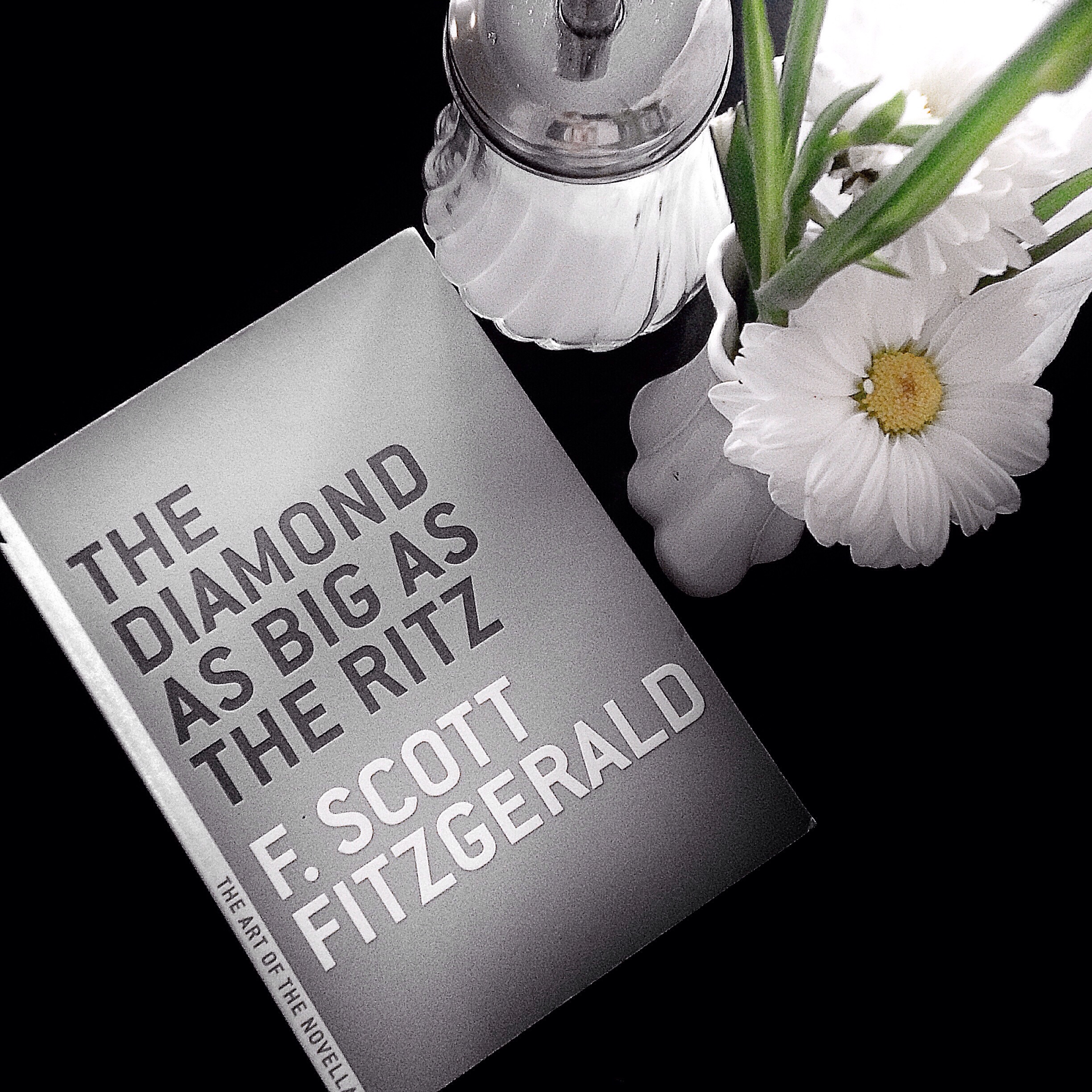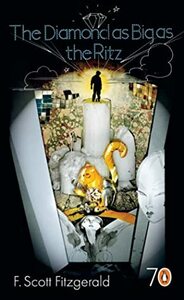Take a photo of a barcode or cover
We’ll be poor, won’t we? Like people in books.

The Beginning: John T. Unger came from a family that had been well known in Hades – a small town on the Mississippi River – for several generations.
This novel is a bit like Brideshead Revisited and The Great Gatsby all rolled into one with a dash of Alice in Wonderland. Here’s the plot: John T. Unger spends a summer at the house of his very wealthy and secretive friend. This family owns a ridiculously large diamond – as big as the Ritz – and are totally paranoid that someone might steal it – so paranoid that John might be in serious danger.
Everybody’s youth is a dream, a form of chemical madness
This was a weird read and not at all what I expected. It smelled like a straightforward classic, but Fitzgerald prods all expectations and plays with our imagination. The story is imaginative in that everything is overdone. The wealth of this family is unbelievable and their luxuries are incredible and almost childish in their the descriptions. Fitzgerald takes us right to the limit of the American Dream and mocks it in the process.
John remembered that first night as a daze of many colors, of quick sensory impressions, of music soft as a voice in love, and of the beauty of things, lights and shadows, and motions and faces.
The novella is beautifully written. Fitzgerald always delivers splendid prose. If you don’t like his stories, you’ll always have his writing. I think the novella form was perfect for this story: it’s a tasty little thing you can devour in a day, but not so short it leaves you hungry for more.
Let us love for a while, for a year or so, you and me. That’s a form of divine drunkenness that we can all try.
For more reviews and book talk, please visit The Bookworm's Closet

The Beginning: John T. Unger came from a family that had been well known in Hades – a small town on the Mississippi River – for several generations.
This novel is a bit like Brideshead Revisited and The Great Gatsby all rolled into one with a dash of Alice in Wonderland. Here’s the plot: John T. Unger spends a summer at the house of his very wealthy and secretive friend. This family owns a ridiculously large diamond – as big as the Ritz – and are totally paranoid that someone might steal it – so paranoid that John might be in serious danger.
Everybody’s youth is a dream, a form of chemical madness
This was a weird read and not at all what I expected. It smelled like a straightforward classic, but Fitzgerald prods all expectations and plays with our imagination. The story is imaginative in that everything is overdone. The wealth of this family is unbelievable and their luxuries are incredible and almost childish in their the descriptions. Fitzgerald takes us right to the limit of the American Dream and mocks it in the process.
John remembered that first night as a daze of many colors, of quick sensory impressions, of music soft as a voice in love, and of the beauty of things, lights and shadows, and motions and faces.
The novella is beautifully written. Fitzgerald always delivers splendid prose. If you don’t like his stories, you’ll always have his writing. I think the novella form was perfect for this story: it’s a tasty little thing you can devour in a day, but not so short it leaves you hungry for more.
Let us love for a while, for a year or so, you and me. That’s a form of divine drunkenness that we can all try.
For more reviews and book talk, please visit The Bookworm's Closet
This short but beautifully written novella encapsulates how Fitzgerald saw the destructive nature of human beings. He explores ideas of materialism, wealth, greed, innocence and - most intricately, I believe - youth in such a way that dazzles you. I love how fragile and beautiful his descriptions are and how powerful his social comments tend to be.
If you're a Gatsby fan, read this.
If you're a Gatsby fan, read this.
A novella written by the author of The Great Gatsby. A young man from a small town on the Mississippi River goes East to a fancy boarding school. He makes a friend who invites him to his home in Montana. When John arrives he finds that all is not as it seems with his friend's family. Their home is located on a mountain that is really a giant diamond which is the source of their wealth and which they are desperate to keep secret.
From BBC Radio 4 Extra:
At school, John T Unger befriends the enigmatic Percy Washington.
But friendship involves John in a scandalous secret - a secret to do with sparkling wealth and cruel abduction. Read by Garrick Hagon.
2/5: John Unger discovers the extraordinary origins of Percy Washington's family wealth.
3/5: John Unger discovers the terrible secret that protects Washington family's incredible wealth.
4/5: John wants to elope with Kismine, but can he escape the fate of all visitors to Percy's home?
5/5: Can John and Kismine escape as Percy's hidden family estate falls under attack?
Written by F Scott Fitzgerald and abridged by Andrew Simpson.
Producer Duncan Minshull
First broadcast on BBC Radio 4 in 1992.
http://www.bbc.co.uk/programmes/b07268ph
At school, John T Unger befriends the enigmatic Percy Washington.
But friendship involves John in a scandalous secret - a secret to do with sparkling wealth and cruel abduction. Read by Garrick Hagon.
2/5: John Unger discovers the extraordinary origins of Percy Washington's family wealth.
3/5: John Unger discovers the terrible secret that protects Washington family's incredible wealth.
4/5: John wants to elope with Kismine, but can he escape the fate of all visitors to Percy's home?
5/5: Can John and Kismine escape as Percy's hidden family estate falls under attack?
Written by F Scott Fitzgerald and abridged by Andrew Simpson.
Producer Duncan Minshull
First broadcast on BBC Radio 4 in 1992.
http://www.bbc.co.uk/programmes/b07268ph
My first short story from Fitzgerald!
This follows a wealthy young boy, John Unger, who attends a preparatory academy full of fellow wealthy students. John ends up agreeing to spend the summer at a fellow peer's house in Montana. This is, at its core, a satirical tale of the wealthy and the bloated, insensitive ideals that seem to come along with such power and privilege. I never thought that I would meet a character that exceeded Tom and Daisy Buchanan's sheer entitlement, however this went far beyond The Great Gatsby in such a sense...
"It's absurd...Think of the millions and millions of people in the world, laborers and all, who get along with only two maids."
(After Kismine tells John that he is probably going to die) "Oh, why did I tell you? I've probably spoiled your whole good time now, and we were really enjoying things when you didn't know it. I knew it would make things sort of depressing for you."
There are many more examples I could pull from this, but nearly every one of them made me laugh. This is simply a bloated, ironic portrayal of the indifference and entitlement of the extremely wealthy during the Jazz Age. The Washington family live within the bounds of something completely beyond luxury, hold those who find their residence hostage in an adorned hole in the ground, and literally keep slaves, because they have not told them that slavery was abolished decades previous to the 1920s. All of this they do with objectivity, ignorant to struggles of the world beyond their wealth. The Washington's home is constructed to be fundamentally perfect, including the girls. However as time goes on there is an overwhelming sense of peril, which ultimately destroys (physically and conceptually) the Washington Residence.
As always, Fitzgerald wrote this with such compelling descriptions, particularly of the Washington's residence in Montana..."Full in the light of the stars, an exquisite chateau rose form the borders of the lake, climbed in marble radiance half the height of an adjoining mountain, then melted in grace, in perfect symmetry, in translucent feminine languor, into the massed darkness of a forest of pine." The estate very much reminded me of the Emerald City, largely because of its profound beauty, yet luring oddities. The mountain is often compared to El Dorado, which I believe was a fitting analysis, especially after reading Voltaire's Candide. In Candide, it is a portrayal of the continuous discontent of humans, and how it is banal to live a perfect life. Even at the end of this story, after nearly everything and everyone is destroyed, Kismine and Jasmine are delighted to abandon their luxurious life and live among average people.
This was crafted so incredibly well, and I cannot wait to read more of his short stories!
This follows a wealthy young boy, John Unger, who attends a preparatory academy full of fellow wealthy students. John ends up agreeing to spend the summer at a fellow peer's house in Montana. This is, at its core, a satirical tale of the wealthy and the bloated, insensitive ideals that seem to come along with such power and privilege. I never thought that I would meet a character that exceeded Tom and Daisy Buchanan's sheer entitlement, however this went far beyond The Great Gatsby in such a sense...
"It's absurd...Think of the millions and millions of people in the world, laborers and all, who get along with only two maids."
(After Kismine tells John that he is probably going to die) "Oh, why did I tell you? I've probably spoiled your whole good time now, and we were really enjoying things when you didn't know it. I knew it would make things sort of depressing for you."
There are many more examples I could pull from this, but nearly every one of them made me laugh. This is simply a bloated, ironic portrayal of the indifference and entitlement of the extremely wealthy during the Jazz Age. The Washington family live within the bounds of something completely beyond luxury, hold those who find their residence hostage in an adorned hole in the ground, and literally keep slaves, because they have not told them that slavery was abolished decades previous to the 1920s. All of this they do with objectivity, ignorant to struggles of the world beyond their wealth. The Washington's home is constructed to be fundamentally perfect, including the girls. However as time goes on there is an overwhelming sense of peril, which ultimately destroys (physically and conceptually) the Washington Residence.
As always, Fitzgerald wrote this with such compelling descriptions, particularly of the Washington's residence in Montana..."Full in the light of the stars, an exquisite chateau rose form the borders of the lake, climbed in marble radiance half the height of an adjoining mountain, then melted in grace, in perfect symmetry, in translucent feminine languor, into the massed darkness of a forest of pine." The estate very much reminded me of the Emerald City, largely because of its profound beauty, yet luring oddities. The mountain is often compared to El Dorado, which I believe was a fitting analysis, especially after reading Voltaire's Candide. In Candide, it is a portrayal of the continuous discontent of humans, and how it is banal to live a perfect life. Even at the end of this story, after nearly everything and everyone is destroyed, Kismine and Jasmine are delighted to abandon their luxurious life and live among average people.
This was crafted so incredibly well, and I cannot wait to read more of his short stories!
listened to this on craftlit. Very funny, but with Fitzgerald's usual poetic flair, and some very sobering moments.




